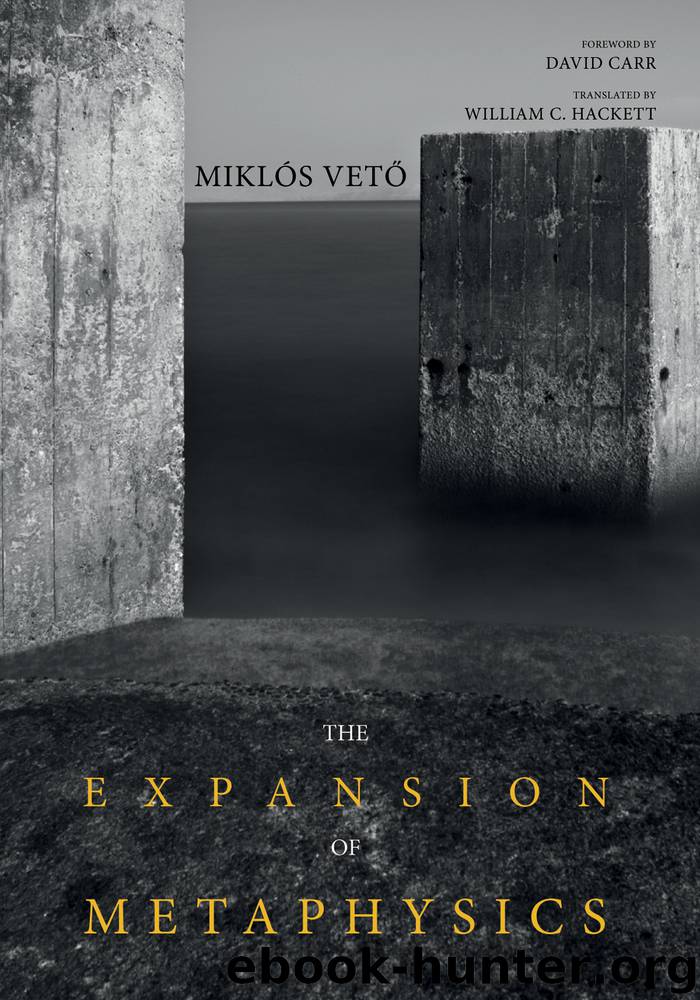The Expansion of Metaphysics by Veto Miklos

Author:Veto, Miklos [Veto, Miklos]
Language: eng
Format: epub
ISBN: 9781498231268
Publisher: Wipf & Stock Publishers
Published: 2018-06-04T07:00:00+00:00
Extension and Expansion
Space possesses a proper eidetic that articulates its manner of being specific. Analogously to the Heideggerian discourse on time that is not, but which temporalizes itself, we could say that space is not but spatializes itself. Spatialization is the unfolding of an intelligibility that expresses the auto-articulation of the specific mode of being of space. Kant defined space as “an infinite given magnitude” (Critique B 39). This infinity is not related to quantity and has nothing to do with the condition of measurable being. Instead it indicates an unfinished state, an incompleteness. Space is not a compositum but a totum: it is not the sum of thinkable or given unities; it is neither a collection nor aggregate of elements. It is a very peculiar totality. Space can be cordoned, sectioned off, but the elements that result from this division have no autonomy: provisionally, or rather artificially separated, they expect only to fall back into the whole. But if the division of space is such an infertile, even pernicious procedure, this is because the sectioning of the spatium cannot be conceived as practiced on a body with firm contours, on a complete reality. Space—like time—is “an incomplete whole.”143 It is therefore something open. And the opening that signifies this incompleteness implies an invitation to go further, to go towards another.
Traditionally, beings in space are designated as res extensa and space itself as extensio. But here a phenomenological reading could avoid the impasses and pitfalls of the ancient consensus. To define space in terms of extension seems nearly self-evident, and yet it is an insufficient and erroneous definition. Extension is rather the expansion of a quality. For example, an extension of whiteness is found in milk, of darkness in ground poppy seeds. In other words that which is “extended” is a quality and thus a material essence. But the eidē of space are not material essences. Extension as diffusion of a quality and thus finally a homogeneity only perpetuates and illustrates an analytic conception of the spatial, while here also one should seek the enlargement of the eidetic in the direction of the synthesis a priori. Instead of extension, diffusion is the term that seems most apt to translate the mode of being of the spatial. Diffusion expresses a certain autonomy of the spatial while extension carries a dominant accent of passivity and heteronomy. The being, or being that is extended slackens, it allows itself to flow. It certainly spreads into the terrain, domain, or locality where it is extended, but this is a gain that does not stem from an internal center and, above all, that constitutes a process where nothing new happens: neither stepping nor leaping over a distance, nor a decision to go in the direction of another and thus no election of a direction. Expansion powerfully registers an active profile. It is an irresistible progression that especially accomplishes the new to the very degree that it emanates from a proper center. Extension seems properly to integrate
Download
This site does not store any files on its server. We only index and link to content provided by other sites. Please contact the content providers to delete copyright contents if any and email us, we'll remove relevant links or contents immediately.
The remains of the day by Kazuo Ishiguro(7551)
Tools of Titans by Timothy Ferriss(6945)
The Black Swan by Nassim Nicholas Taleb(6190)
Inner Engineering: A Yogi's Guide to Joy by Sadhguru(5894)
Giovanni's Room by James Baldwin(5877)
The Way of Zen by Alan W. Watts(5798)
The Six Wives Of Henry VIII (WOMEN IN HISTORY) by Fraser Antonia(4790)
The Power of Now: A Guide to Spiritual Enlightenment by Eckhart Tolle(4753)
Astrophysics for People in a Hurry by Neil DeGrasse Tyson(4620)
Asking the Right Questions: A Guide to Critical Thinking by M. Neil Browne & Stuart M. Keeley(4574)
12 Rules for Life by Jordan B. Peterson(3733)
The Ethical Slut by Janet W. Hardy(3502)
Skin in the Game by Nassim Nicholas Taleb(3459)
Housekeeping by Marilynne Robinson(3401)
The Art of Happiness by The Dalai Lama(3382)
Double Down (Diary of a Wimpy Kid Book 11) by Jeff Kinney(3272)
Skin in the Game: Hidden Asymmetries in Daily Life by Nassim Nicholas Taleb(3264)
Walking by Henry David Thoreau(3234)
12 Rules for Life: An Antidote to Chaos by Jordan B. Peterson(3200)
